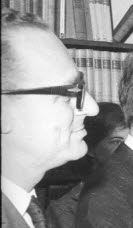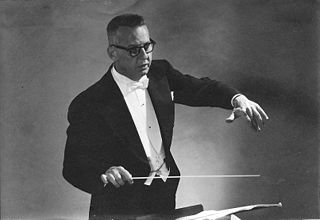
The Chicago Symphony Orchestra (CSO) is an American symphony orchestra based in Chicago, Illinois. Founded by Theodore Thomas in 1891, the ensemble has been based in the Symphony Center since 1904 and plays a summer season at the Ravinia Festival. Klaus Mäkelä was named music director-designate in 2024, with his first contractual season to begin in 2027. The orchestra's most recent music director is Riccardo Muti, whose tenure spanned the seasons from 2010 to 2023, and he continues to perform on occasion as director-emeritus. The CSO is one of the American orchestras commonly referred to as the "Big Five".
The Columbia Symphony Orchestra was an orchestra formed by Columbia Records for the purpose of making recordings. In the 1950s, it provided a vehicle for some of Columbia's better known conductors and recording artists to record using only company resources. The musicians in the orchestra were contracted as needed for individual sessions and consisted of free-lance artists and often members of either the New York Philharmonic or the Los Angeles Philharmonic, depending on whether the recording was being made in Columbia's East Coast or West Coast studios.

Arturo Toscanini was an Italian conductor. He was one of the most acclaimed and influential musicians of the late 19th and early 20th century, renowned for his intensity, his perfectionism, his ear for orchestral detail and sonority, and his eidetic memory. He was at various times the music director of La Scala in Milan and the New York Philharmonic. Later in his career, he was appointed the first music director of the NBC Symphony Orchestra (1937–1954), and this led to his becoming a household name, especially in the United States, through his radio and television broadcasts and many recordings of the operatic and symphonic repertoire.

Leopold Anthony Stokowski was a British-born American conductor. One of the leading conductors of the early and mid-20th century, he is best known for his long association with the Philadelphia Orchestra. He was especially noted for his free-hand conducting style that spurned the traditional baton and for obtaining a characteristically sumptuous sound from the orchestras he directed.

The Concerto for Orchestra, Sz. 116, BB 123, is a five-movement orchestral work composed by Béla Bartók in 1943. It is one of his best-known, most popular, and most accessible works.

István Kertész was a Hungarian orchestral and operatic conductor who throughout his brief career led many of the world's great orchestras, including the Cleveland, Chicago, Philadelphia, New York, Los Angeles, Pittsburgh, Detroit, San Francisco and Minnesota Orchestras in the United States, as well as the London Symphony, Vienna Philharmonic, Berlin Philharmonic, Royal Concertgebouw Orchestra, Israel Philharmonic, and L'Orchestre de la Suisse Romande.

Erich Leinsdorf was an Austrian-born American conductor. He performed and recorded with leading orchestras and opera companies throughout the United States and Europe, earning a reputation for exacting standards as well as an acerbic personality. He also published books and essays on musical matters.

Artur Rodziński was a Polish and American conductor of orchestral music and opera. He began his career after World War I in Poland, where he was discovered by Leopold Stokowski, who invited him to be his assistant with the Philadelphia Orchestra. This engagement led to Rodziński becoming music director of the Los Angeles Philharmonic, Cleveland Orchestra, New York Philharmonic, and the Chicago Symphony Orchestra. He also prepared the NBC Symphony Orchestra for Arturo Toscanini before the Italian conductor's debut with them. A dispute in Chicago led to Rodziński's dismissal in 1948, whereupon he shifted his career to Europe, eventually settling in Italy, although continuing to maintain a home in Lake Placid, New York. In November 1958, beset by heart disease, he made his professional return to the United States for the first time in a decade, conducting acclaimed performances of Richard Wagner's Tristan und Isolde with the Lyric Opera of Chicago. Exhausted, he checked into Massachusetts General Hospital where he died 11 days later.

William Steinberg was a German-American conductor.

Michael Andreas Gielen was an Austrian conductor and composer known for promoting contemporary music in opera and concert. Principally active in Europe, his performances are characterized by precision and vivacity, aiding his ability to interpret the complex contemporary music he specialized in.

Walter Hendl was an American conductor, composer and pianist.

James W. Sample was an American conductor.
The Piano Concerto No. 1, Sz. 83, BB 91 of Béla Bartók was composed in 1926. Average playing time is between 23 and 24 minutes.
Richard Mohr was one of RCA Victor’s most prominent producers of classical and operatic music recordings from 1943 through 1977. His producing credits included recording the casts of the world premieres of Samuel Barber's Vanessa and Gian Carlo Menotti's Amahl and the Night Visitors, as well as the first LP recordings of Ernani,Luisa Miller and Lucrezia Borgia and three versions each of Rigoletto,Aida,La Traviata and Il Trovatore.
The Chicago Symphony Chorus began on September 22, 1957, when the Chicago Symphony Orchestra (CSO) announced that Margaret Hillis would organize and train a symphony chorus. The music director Fritz Reiner's original intent was to utilize the chorus for the two weeks of subscription concerts that season, performing George Frideric Handel's Messiah in December and Giuseppe Verdi's Requiem in April. When Bruno Walter informed the orchestra's management that his March 1958 appearances would be his last in Chicago, the board president, Eric Oldberg, insisted that Walter conduct Wolfgang Amadeus Mozart's Requiem utilizing the new chorus. During that first season, it was logistically impossible for Hillis to audition and prepare a new Chorus for three major works within less than four months. As an interim fix, the Apollo Chorus of Chicago was used for the Christmas Messiah concerts.

Wassili Leps was a Russian-born American composer and conductor.
Vladimir Romanovich Bakaleinikov, also Bakaleynikov and Bakaleinikoff was a Russian-American violist, music educator, conductor and composer.

Henry Simon Mazer, was an American and later Taiwanese conductor, recording artist and music educator who was the founding principal conductor and music director of Taipei Philharmonic Orchestra from 1985 until suffering a stroke in February 2001. Prior to his move to Taiwan, he was the conductor and associate conductor of major American symphonies including the Chicago Symphony Orchestra. He contributed greatly to the refinement of the performances of classical music in Taiwan, leading local musicians to gain recognition overseas. There is a cultural center dedicated to him in Taipei.

Lambertus Reiner "Reinbert" de Leeuw was a Dutch conductor, pianist and composer.
Les nuits d'été, Op. 7, is a song cycle by the French composer Hector Berlioz, setting six poems by Théophile Gautier. The cycle, completed in 1841, was originally for soloist and piano accompaniment. Berlioz orchestrated one of the songs in 1843 and did the same for the other five in 1856. The cycle was neglected for many years, but during the 20th century it became, and has remained, one of the composer's most popular works. Of the many recordings made in the 20th and 21st centuries, most are of the orchestrated version and are sung by a soprano or mezzo-soprano.














